Intradiscal steroid injections are a type of injection therapy used to treat chronic back pain caused by damage to the intervertebral discs. These injections involve injecting a corticosteroid medication directly into the affected intervertebral disc to reduce inflammation, relieve pain, and promote healing.
Intradiscal injections are typically done under fluoroscopic guidance, which involves using X-ray imaging to guide the needle into the correct location within the disc. The procedure is usually performed on an outpatient basis and can be effective for managing chronic back pain in some patients.
Intradiscal steroid injections are also known as intervertebral disc injections, or simply as disc injections.
How do intradiscal steroid injections work?
Intradiscal steroid injections work by reducing inflammation and swelling in the affected intervertebral disc, which can help to alleviate pain and promote healing. The procedure involves injecting a corticosteroid medication directly into the damaged disc using a needle under fluoroscopic guidance.
Corticosteroids are anti-inflammatory medications that can help to reduce inflammation and swelling around the damaged disc. By reducing inflammation, pressure on surrounding nerves is also reduced, which can help to alleviate pain. The medication is injected directly into the disc to deliver the medication exactly where it is needed.
Which conditions are they used to treat?
Intradiscal steroid injections are typically used to treat chronic back pain caused by damage to the intervertebral discs. Some of the conditions that may be treated with intradiscal steroid injections include:
- Herniated discs: A herniated disc occurs when the soft inner material of the disc leaks out through a tear in the outer layer. This can cause pain and pressure on surrounding nerves.
- Degenerative disc disease: This is a condition that occurs when the intervertebral discs gradually break down over time due to wear and tear. This can cause pain and inflammation in the affected area.
Who performs intradiscal steroid injections?
Intradiscal steroid injections are typically performed by a healthcare provider who has received specialized training in the procedure. This may include a pain management specialist, a physiatrist, an interventional radiologist, or a neurosurgeon.
What to expect during the procedure
During the intradiscal steroid injection procedure, the patient will typically lie on their stomach on an X-ray table, and the area around the injection site will be cleaned and numbed with a local anesthetic. The patient may be given a mild sedative to help them relax.
The healthcare provider will use X-ray guidance to precisely guide a needle into the affected intervertebral disc. Once the needle is in place, the corticosteroid medication will be injected into the disc.
The entire procedure typically takes around 30 minutes to complete. After the injection, the patient will be monitored for a short time before being allowed to go home.
What is recovery time after the procedure?
In general, patients may experience some discomfort or pain at the injection site for a few days after the procedure. Most patients are able to resume their normal activities within a day or two of the injection, although some may need to take it easy for a few days after the procedure.
Patients who have physically demanding jobs or who engage in strenuous activities may need to take more time off work or avoid these activities for a longer period of time. It is important for patients to follow their healthcare provider’s instructions and to avoid any activities that could aggravate their condition or interfere with their recovery.
How long do intradiscal steroid injections take to work?
In general, it may take a few days to a week for the steroid medication to take effect and provide pain relief. However, some patients may experience immediate pain relief, while others may not experience significant improvement for several weeks after the injection.
It is important to note that the effectiveness of the injection can also depend on the underlying cause of the patient’s pain, and some patients may require additional injections or other treatments to achieve optimal pain relief.
What are the risks of intradiscal steroid injections?
Intradiscal steroid injections are generally considered safe, but like any medical procedure, they do carry some risks and potential complications. These may include:
- Infection: There is a risk of infection at the injection site, which can lead to serious complications if left untreated.
- Bleeding: In rare cases, the needle used during the injection may puncture a blood vessel, which can cause bleeding.
- Nerve damage: The needle used during the injection may accidentally damage nerves in the area, which can cause pain, numbness, or weakness.
- Adrenal suppression: In rare cases, the corticosteroid medication used during the injection can suppress the function of the adrenal glands, which can lead to a range of hormonal imbalances.
It is important for patients to discuss any potential risks or complications with their healthcare provider before undergoing an intradiscal steroid injection, and to report any severe or worsening pain or other symptoms to their provider immediately.
Are intradiscal steroid injections right for me?
In general, intradiscal steroid injections may be considered for patients with certain types of chronic back pain, such as discogenic pain, herniated discs, and degenerative disc disease, who have not responded to other conservative treatments, such as physical therapy, medications, or rest.
Your healthcare provider can help you determine whether intradiscal steroid injections may be appropriate for your condition, and can work with you to develop a personalized treatment plan that takes into account your individual needs, goals, and medical history. They can also discuss alternative treatment options if intradiscal steroid injections are not appropriate for you.
